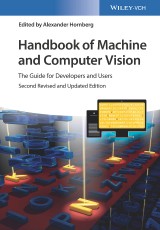Details

Handbook of Machine and Computer Vision
The Guide for Developers and Users2. Aufl.
|
223,99 € |
|
| Verlag: | Wiley-VCH |
| Format: | EPUB |
| Veröffentl.: | 06.03.2017 |
| ISBN/EAN: | 9783527413416 |
| Sprache: | englisch |
| Anzahl Seiten: | 860 |
DRM-geschütztes eBook, Sie benötigen z.B. Adobe Digital Editions und eine Adobe ID zum Lesen.
Beschreibungen
The second edition of this accepted reference work has been updated to reflect the rapid developments in the field and now covers both 2D and 3D imaging.<br> Written by expert practitioners from leading companies operating in machine vision, this one-stop handbook guides readers through all aspects of image acquisition and image processing, including optics, electronics and software. The authors approach the subject in terms of industrial applications, elucidating such topics as illumination and camera calibration. Initial chapters concentrate on the latest hardware aspects, ranging from lenses and camera systems to camera-computer interfaces, with the software necessary discussed to an equal depth in later sections. These include digital image basics as well as image analysis and image processing. The book concludes with extended coverage of industrial applications in optics and electronics, backed by case studies and design strategies for the conception of complete machine vision systems. As a result, readers are not only able to understand the latest systems, but also to plan and evaluate this technology.<br> With more than 500 images and tables to illustrate relevant principles and steps.
Preface Second Edition xxiii <p>Preface First Edition xxv</p> <p>List of Contributors xxvii</p> <p><b>1 Processing of Information in the Human Visual System 1</b><br /><i>Frank Schaeffel</i></p> <p>1.1 Preface 1</p> <p>1.2 Design and Structure of the Eye 1</p> <p>1.3 Optical Aberrations and Consequences for Visual Performance 3</p> <p>1.4 Chromatic Aberration 10</p> <p>1.5 Neural Adaptation to Monochromatic Aberrations 11</p> <p>1.6 Optimizing Retinal Processing with Limited Cell Numbers, Space, and Energy 11</p> <p>1.7 Adaptation to Different Light Levels 12</p> <p>1.8 Rod and Cone Responses 14</p> <p>1.9 Spiking and Coding 16</p> <p>1.10 Temporal and Spatial Performance 17</p> <p>1.11 ON/OFF Structure, Division of the Whole Illuminance Amplitude 18</p> <p>1.12 Consequences of the Rod and Cone Diversity on RetinalWiring 18</p> <p>1.13 Motion Sensitivity in the Retina 19</p> <p>1.14 Visual Information Processing in Higher Centers 20</p> <p>1.15 Effects of Attention 23</p> <p>1.16 Color Vision, Color Constancy, and Color Contrast 23</p> <p>1.17 Depth Perception 25</p> <p>1.18 Adaptation in the Visual System to Color, Spatial, and Temporal Contrast 26</p> <p>1.19 Conclusions 26</p> <p>Acknowledgements 28</p> <p>References 28</p> <p><b>2 Introduction to Building a Machine Vision Inspection 31</b><br /><i>Axel Telljohann</i></p> <p>2.1 Preface 31</p> <p>2.2 Specifying a Machine Vision System 32</p> <p>2.3 Designing a Machine Vision System 36</p> <p>2.4 Costs 48</p> <p>2.5 Words on Project Realization 49</p> <p>2.6 Examples 50</p> <p><b>3 Lighting in Machine Vision 63</b><br /><i>Irmgard Jahr</i></p> <p>3.1 Introduction 63</p> <p>3.2 Demands on Machine Vision lighting 67</p> <p>3.3 Light used in Machine Vision 70</p> <p>3.4 Interaction of Test Object and Light 91</p> <p>3.5 Basic Rules and Laws of Light Distribution 109</p> <p>3.6 Light Filters 121</p> <p>3.7 Lighting Techniques and Their Use 131</p> <p>3.8 Lighting Control 163</p> <p>3.9 Lighting Perspectives for the Future 176</p> <p>References 177</p> <p><b>4 Optical Systems in Machine Vision 179</b><br /><i>Karl Lenhardt</i></p> <p>4.1 A Look at the Foundations of Geometrical Optics 179</p> <p>4.2 Gaussian Optics 183</p> <p>4.3 Wave Nature of Light 235</p> <p>4.4 Information Theoretical Treatment of Image Transfer and Storage 252</p> <p>4.5 Criteria for Image Quality 277</p> <p>4.6 Practical Aspects: How to Specify Optics According to the Application Requirements? 285</p> <p>References 289</p> <p><b>5 Camera Calibration 291</b><br /><i>Robert Godding</i></p> <p>5.1 Introduction 291</p> <p>5.2 Terminology 292</p> <p>5.3 Physical Effects 293</p> <p>5.4 Mathematical Calibration Model 295</p> <p>5.5 Calibration and Orientation Techniques 302</p> <p>5.6 Verification of Calibration Results 308</p> <p>5.7 Applications 309</p> <p>References 314</p> <p><b>6 Camera Systems in Machine Vision 317</b><br /><i>Horst Mattfeldt</i></p> <p>6.1 Camera Technology 317</p> <p>6.2 Sensor Technologies 319</p> <p>6.3 Block Diagrams andTheir Description 344</p> <p>6.4 mvBlueCOUGAR-X Line of Cameras 354</p> <p>6.5 Configuration of a GigE Vision Camera 384</p> <p>6.6 Qualifying Cameras and Noise Measurement (Dr. Gert Ferrano MV) 386</p> <p>6.7 Camera Noise (by Henning Haider AVT, Updated by Author) 391</p> <p>6.8 Useful Links and Literature 394</p> <p>6.9 Digital Interfaces 395</p> <p><b>7 Smart Camera and Vision Systems Design 399</b><br /><i>Howard D. Gray and Nate Holmes</i></p> <p>7.1 Introduction to Vision System Design 399</p> <p>7.2 Definitions 400</p> <p>7.3 Smart Cameras 403</p> <p>7.4 Vision Sensors 418</p> <p>7.5 Embedded Vision Systems 421</p> <p>7.6 Conclusion 425</p> <p>References 426</p> <p>Further Reading 429<br /><br /><b>8 Camera Computer Interfaces 431</b><br /><i>Nate Holmes</i></p> <p>8.1 Overview 431</p> <p>8.2 Camera Buses 432</p> <p>8.3 Choosing a Camera Bus 459</p> <p>8.4 Computer Buses 463</p> <p>8.5 Choosing a Computer Bus 471</p> <p>8.6 Driver Software 473</p> <p>8.7 Features of a Machine Vision System 491</p> <p>8.8 Summary 501</p> <p>References 502</p> <p><b>9 Machine Vision Algorithms 505</b><br /><i>Carsten Steger</i></p> <p>9.1 Fundamental Data Structures 505</p> <p>9.2 Image Enhancement 509</p> <p>9.3 Geometric Transformations 532</p> <p>9.4 Image Segmentation 540</p> <p>9.5 Feature Extraction 552</p> <p>9.6 Morphology 560</p> <p>9.7 Edge Extraction 579</p> <p>9.8 Segmentation and Fitting of Geometric Primitives 602</p> <p>9.9 Camera Calibration 613</p> <p>9.10 Stereo Reconstruction 631</p> <p>9.11 Template Matching 643</p> <p>9.12 Optical Character Recognition 672</p> <p>References 690</p> <p><b>10 Machine Vision in Manufacturing 699</b><br /><i>Peter Waszkewitz</i></p> <p>10.1 Introduction 699</p> <p>10.2 Application Categories 701</p> <p>10.3 System Categories 706</p> <p>10.4 Integration and Interfaces 715</p> <p>10.5 Mechanical Interfaces 716</p> <p>10.6 Electrical Interfaces 725</p> <p>10.7 Information Interfaces 729</p> <p>10.8 Temporal Interfaces 738</p> <p>10.9 Human–Machine Interfaces 745</p> <p>10.10 3D Systems 753</p> <p>10.11 Industrial Case Studies 772</p> <p>10.12 Constraints and Conditions 789</p> <p>References 796</p> <p>Appendix 801</p> <p>Index 805</p>
The editor, Alexander Hornberg, worked as development and software engineer in industry. Since 1997 he has been working in the field of machine vision in an academic environment. He is Professor for Image Processing and Applied Optics at the University of Applied Sciences Esslingen, Germany.<br> All contributors to this work are written by practitioners from leading companies which operate in the field of computer vision.

















